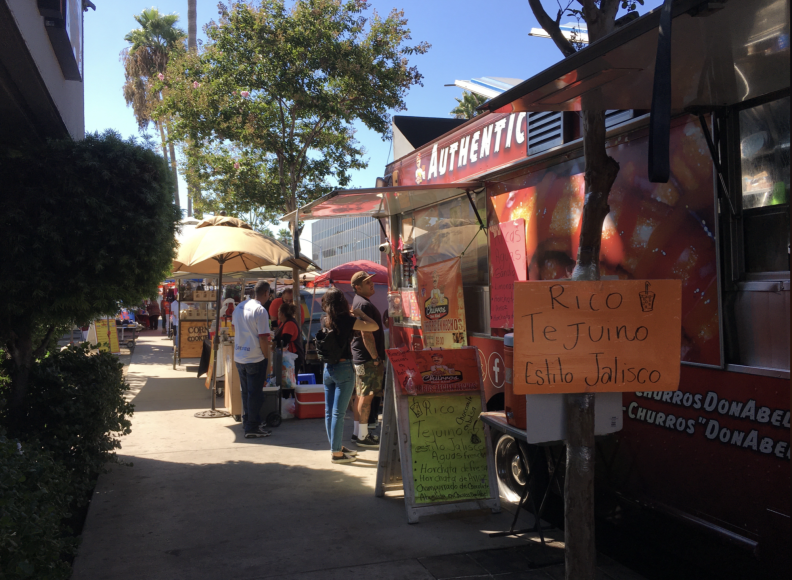LA Street Vendors Look To Bill In Sacramento For Help Getting Permits

One hot Sunday afternoon along Whittier Boulevard in East Los Angeles, street vendor Cesar Benitez and his wife Margarita were doing brisk business at their aguas frescas stand, ladling their candy-colored, Mexican-style fruit drinks into cups of ice for thirsty customers.
They were among the dozens of food and non-food vendors lining the sidewalk next to the Commerce Center shopping development, which sits on the Commerce side of the border.
This stretch is home to a popular street food scene — in spite of what vendors here describe as frequent visits from county public health officials and Sheriff’s deputies. Sometimes during these visits, Benitez said, his colorful aguas frescas have wound up in the trash.
“They throw it all away,” he bemoaned. “In my case, they’ll get a trash can or something, and throw out everything we have.”
-
At magnitude 7.2, buildings collapsed
-
Now spinning in front of Santa Monica apartments
-
Advocates seek end to new LAUSD location policy
Then “they just give us a paper and tell us that we need a health permit,” he said.
Benitez knows he needs a county health permit. Although California decriminalized street vending four years ago, street vendors who sell food must have one if they’re to do business legally.
But as Benitez and others have experienced, trying to get one under the current state rules that govern mobile food sellers has been an exercise in frustration. He said he’s tried to get a health permit, but he can’t.

“When I’ve gone to public health,” he said, “I sell aguas frescas, and I’ve been told that I need to have a lonchera, like this one,” pointing to a large food truck nearby — a vehicle that he said is way beyond his budget.
Benitez said a couple of years ago, he even put a down payment on a new cart that he’d hoped would help him pass muster. But at least for the time being, he said, no cart will do for what he’s selling.
“Unfortunately,” Benitez went on, “with the laws as they are now, there’s no existing permit public health can give us.”
The law was written for food trucks.
It’s complicated: County health permits are readily available to many mobile food sellers — like food trucks, for example, or pushcart vendors who sell packaged foods, like ice cream.
But they are harder to come by for street vendors who sell unpackaged food or drinks, like tacos, or aguas frescas, or even the ubiquitous bacon-wrapped hot dogs sold by street vendors all over town.
Street vendor advocates say this is because with few exceptions, California’s rules governing retail food operations aren’t geared toward small, pushcart-type vendors.
Creating New Rules For Smaller-Scale Vendors
“The law was written for food trucks, essentially,” said Doug Smith, supervising senior staff attorney with Public Counsel, a pro bono legal services organization that’s long worked with L.A. street vendors.
Food vendors are required to have things like large three-compartment sinks, overhead mechanical exhaust ventilation systems, large refrigeration equipment requirements, "things that you would see on a food truck or a commercial grade kitchen, but don't make sense for a small-scale sidewalk funding operation,” Smith said.

The California Retail Food Code requires mobile food sellers who sell non-packaged items to have cumbersome and costly equipment if they’re to comply with health rules, he said.
A bill that cleared the state legislature in late August and is on Gov. Gavin Newsom’s desk aims to change this. SB 972, sponsored by State Sen. Lena Gonzalez (D-Long Beach), would update the retail food code, making it easier for street vendors to obtain health permits with smaller, more affordable equipment.
It would also give street vendors easier access to approved commissary space to prepare their food and allow additional food preparation to occur on a vendor’s cart — for example, reheating previously cooked food, or slicing fruit.
The bill would also remove criminal penalties for noncompliance, replacing misdemeanor penalties with administrative fines for code violations. Critics of the bill have worried that it could diminish local governments’ power to regulate street vendors.
State Sen. Ben Allen (D-Santa Monica) is among those who have worried about regulating street vendors. He sponsored related legislation earlier this year that sought to give local authorities more control over enforcement.
“I think having a better path to permitting will help,” said Allen, who ultimately backed SB 972. Still, “one of the challenges that cities have is that there's just not a lot of enforceability in the current system,” he said.
But something has to change, street vendor advocates say, if legal street vending programs like the one in L.A. are to work at all.
Few Takers For LA City Permits
“Without changes to the state retail food code, street vending programs will not be successful for food vendors,” said Public Counsel’s Smith.
This is borne out by the meager number of takers for L.A. city sidewalk vending permits, which rolled out just before the street vending business was slammed by the pandemic.
According to the city Department of Public Works, since L.A. began issuing sidewalk permits to street vendors in early 2020, only 237 food vendors have obtained one — a drop in the bucket considering L.A. County has an estimated 10,000 street vendors who sell food.
By comparison, the city has issued 2,549 merchandise permits to street vendors who sell non-food items; these vendors don’t need health permits, and have an easier time setting up legally under the current rules.

It’s not like the roadblocks for street food vendors were unanticipated when the city permit program was created, said Rudy Espinoza, executive director of Inclusive Action for the City, a nonprofit that advocates for L.A. street vendors.
Espinoza said at the time, just getting a permit program approved was a huge task for street vendors and advocates who had lobbied for legalization for years.
“We knew then that it was only part of the solution,” he said, but “we didn't have all the political will to do it all at once.”
‘Nothing’s Really Changed’
On a corner off Cesar Chavez Avenue in Boyle Heights, bacon-wrapped hot dog vendor Graciela Quiroz sat cleaning her cart, the same one she had back in 2019 when I interviewed her in this same spot.

“Nothing has changed, everything remains the same,” she grumbled as she scrubbed her tiny cart, which can’t accommodate much more than a grill. “They come and ask you for things, they give you all these requirements — that you have to have this, that you have to have that. But where?”
But she’s been following the news about the street vendor bill, she said, and is hoping there will be some good news that makes her work easier.
“They give us so many obstacles,” Quiroz said. “Let’s see what they figure out up in Sacramento.”
Newsom has until the end of the month to sign the bill.
-
The severe lack of family friendly housing has millennial parents asking: Is leaving Southern California our only option?
-
As the March 5 primary draws closer, many of us have yet to vote and are looking for some help. We hope you start with our Voter Game Plan. Since we don't do recommendations, we've also put together a list of other popular voting guides.
-
The state's parks department is working with stakeholders, including the military, to rebuild the San Onofre road, but no timeline has been given.
-
Built in 1951, the glass-walled chapel is one of L.A.’s few national historic landmarks. This isn’t the first time it has been damaged by landslides.
-
The city passed a law against harassing renters in 2021. But tenant advocates say enforcement has been lacking.
-
After the luxury towers' developer did not respond to a request from the city to step in, the money will go to fence off the towers, provide security and remove graffiti on the towers.









